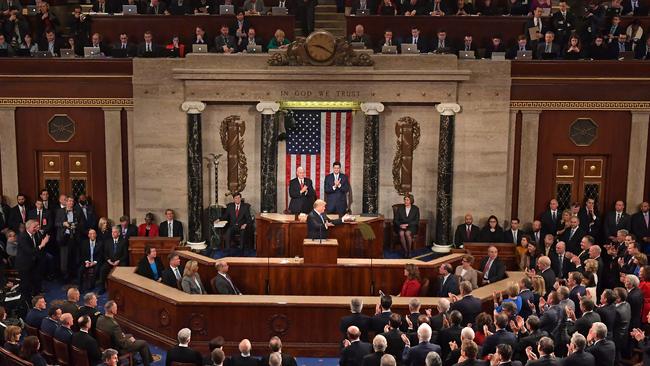
Donald Trump’s critics constantly ask him to be presidential and statesmanlike. Well, now he has certainly given a presidential and statesmanlike State of the Union address, will they give him the benefit of the doubt?
The President’s speech shows the superiority of Teleprompter Trump over Twitter Trump.
This was a strong speech and it had a pretty good story to tell. Since Trump became President a year ago, the US economy has added 2.4 million jobs, including 200,000 in manufacturing. Unemployment levels are way down, but African-American unemployment, and Hispanic unemployment, are particularly way down. You can say what you like about Trump’s sometimes divisive rhetoric — and I’ve said plenty myself — but there are very few better actions for social justice than for a member of a poor or marginalised community to get a job.
It not only brings financial resources but it brings self-respect and a stake in society.
The Trump administration has made a bonfire of useless regulations. It cuts and burns red tape. This undoubtedly has released the animal spirits of the economy.
Trump’s tax cuts, his deregulation and his generally pro-business outlook have seen the American economy boom and the stockmarket add $US8 trillion ($9.9 trillion) in value.
All of that has its complications. There is not a schmick of evidence Trump is making any effort to address the deficit, other than hoping the US economy will grow so fast that the burden of government debt becomes relatively lighter.
But you can be sure that if the economy had tanked under Trump, he would have got all the blame, so he certainly is entitled to bask in some of the credit for the economic surge.
On top of that, he has produced a perfectly credible immigration compromise. It is not everything the hardline nativists in his support base want; it offers a path to citizenship for one million illegal immigrants. That is generous by anyone’s standards.
But it also puts to an end two outrageous rorts in the US system. One is chain migration, by which immigrants can sponsor an almost endless string of distant relatives, who then themselves can sponsor their own distant relatives more or less ad infinitum. The other is the absurd green-card lottery — a ludicrous system unrelated to merit or anything else.
Trump also wants to secure America’s borders. It was always the case that his proposal to build a wall along the border with Mexico was legitimate. What was ridiculous was the claim that Mexico would pay for it.
Americans overwhelmingly want to secure their borders. They do not want to end immigration, just make sure that their government controls it.
Trump wants a merit-based immigration system. As he has often said, he wants a system almost exactly like Australia’s, one in which borders are controlled, there is overwhelming emphasis on selection by skills and merit, there is provision for close family — spouses, dependent children and the like — and there is a refugee intake determined by the government.
Australian admirers of Trump who think they are aping his attitudes by calling for a savage cut to our highly successful immigration system are wrong in this, as they are on most things. John Howard and then Tony Abbott restored control of our borders. Malcolm Turnbull has retained that control.
As a result we are free to administer the most successful immigration program in the world. Australian right-wingers who want to mess that up are pursuing the opposite of the policies Trump himself is now sensibly proposing.
On foreign policy the most important message was that Trump explicitly named China and Russia as rivals.
All of his specific policy commitments in this speech are sensible. He wants to modernise the US nuclear arsenal — as did Barack Obama, belatedly. He wants to keep this arsenal up to date and completely credible and never use it. That’s the right approach.
Trump made a strong pitch for congress to authorise increased defence expenditure. This is one area where Trump is manifestly superior to Obama and every US ally, and everyone who values the public good of security that the US supplies, should back this.
Controversially, Trump wants to keep Guantanamo Bay open. He makes a strong case that the US needs a place to incarcerate the worst terrorists. This is also a reasonable decision. No doubt it will generate howls of protest, but contrast it again with Obama.
Obama promised to shut Guantanamo and decided to do so, but in eight years in office was unable even to carry out his own policy. So is the US better off using Guantanamo sensibly or denouncing its own facility but still refusing to close it?
In the most truculent bit of his speech, Trump said he was not going to give US aid to countries that act against American interests. Yet this is surely a position his countrymen would support and in many cases it merely gives expression to common sense.
Trump should handle these matters with some diplomatic competence but the basic message is sound enough: the US will not subsidise bad actors to act badly, and against the US, in the hope that they do not become worse.
The speech was peppered with real-life examples and Trump often referred to people in the audience — a classic State of the Union device pioneered by the peerless Ronald Reagan.
This was a strong and worthy speech. There are signs that the Trump administration may be maturing.
That, of course, represents his critics’ worst nightmare.








To join the conversation, please log in. Don't have an account? Register
Join the conversation, you are commenting as Logout